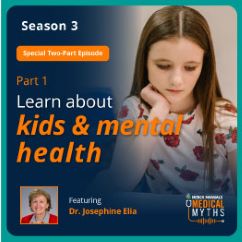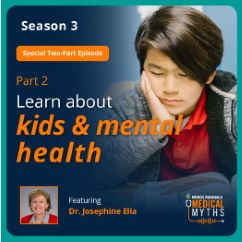Anxiety disorders are characterized by fear, worry, or dread that greatly impairs the ability to function and is out of proportion to the circumstances.
There are many types of anxiety disorders, distinguished by their primary focus on fear, worry, or dread.
Most commonly, children refuse to go to school, often experiencing physical symptoms, such as a stomachache, as the reason.
Doctors usually base the diagnosis on symptoms but sometimes do tests to rule out disorders that could produce the physical symptoms often caused by anxiety.
Behavioral therapy is often sufficient, but if anxiety is severe, medications may be needed.
All children feel some anxiety sometimes. For example, 3- and 4-year-olds are often afraid of the dark or monsters. Older children and adolescents often become anxious when presenting information in public (for example, while giving a book report in front of their classmates). Such fears and anxieties are not signs of a disorder. However, if children become so anxious that they cannot function or become greatly distressed, they may have an anxiety disorder. Studies show that about 3% of 6-year-olds, 5% of adolescent boys, and 10% of adolescent girls have anxiety disorders. Children with an anxiety disorder are at increased risk of depression, suicidal behavior, alcohol and substance use disorders, and academic difficulties later in life.
People can inherit a tendency to be anxious. Anxious parents tend to have anxious children, and their parenting style may make the children's symptoms worse than they would otherwise be. Even typical children have difficulty remaining calm and composed in the presence of an anxious parent, and children who are genetically predisposed to anxiety have even greater difficulty doing so. Maltreatment at home or school and a lack of ability to control one's circumstances may also contribute to anxiety disorders, which tend to be more pronounced in children and adolescents than in adults. (See Anxiety and Stressor-Related Disorders in adults.)
Anxiety disorders include the following:
During the COVID-19 pandemic, anxiety symptoms in young people doubled, especially in girls. Mental health visits for anxiety also increased. After controlling for gender, age, and pre-COVID anxiety symptoms, the following were found to be significant predictors of COVID-19 anxiety symptoms in children:
Poor connectedness to caregiver
Sleep problems
High amounts of screen time
Symptoms of Anxiety Disorders
Many children with an anxiety disorder refuse to go to school. They may have separation anxiety, social anxiety, or panic disorder or some combination of these disorders. Some children may have a specific phobia, and there is the possibility that others are being bullied at school.
Some children talk specifically about their anxiety. For example, they may say “I am worried that I will never see you again” (separation anxiety) or “I am worried the kids will laugh at me” (social anxiety disorder). However, most children complain of physical symptoms, such as a stomachache. These children are often telling the truth because anxiety often causes an upset stomach, nausea, headaches, and sleep problems in children. Panic attacks in older children may show up as intense fear or discomfort that may include symptoms such as heart palpitations, shortness of breath, or feelings of impending doom.
Many children who have an anxiety disorder struggle with anxiety into adulthood. However, with early treatment, many children learn how to control their anxiety.
Diagnosis of Anxiety Disorders in Children
A doctor’s (or behavioral health specialist's) evaluation, based on standard psychiatric diagnostic criteria
Sometimes questionnaires about symptoms
Sometimes observing the child's behavior
Tests to check for other causes of symptoms
Doctors usually diagnose an anxiety disorder when the child or parents describe typical symptoms. The doctor will also talk with the child and may observe the child's activities or ask the child or parents to fill out a specialized questionnaire.
Some symptoms that anxiety can cause may also be caused by a medical issue, and doctors may do tests for physical disorders before an anxiety disorder is considered.
Treatment of Anxiety Disorders in Children
Behavioral therapy
Sometimes medications
If anxiety is mild, behavioral therapy alone is usually all that is needed.
One form of therapy that is often effective is called cognitive-behavioral therapy (CBT). CBT is a short-term, structured form of talk therapy designed to help people identify and then challenge negative thought patterns so that they can deal with difficult situations more effectively.
Another approach is called exposure therapy. Therapists expose children to the situation that triggers anxiety and help the children remain in the situation and feel comfortable. Thus, children gradually become desensitized and feel less anxiety. When appropriate, treating anxiety in parents at the same time often helps.
If anxiety is severe, medications may be used. A type of antidepressant called a selective serotonin reuptake inhibitor (SSRI), such as fluoxetine or sertraline, is usually the first choice if medication treatment is needed for a long time. Most children can take SSRIs without any problem. However, some children have an upset stomach, diarrhea, or insomnia, or gain weight. A few become restless or more impulsive. Another option is selective norepinephrine reuptake inhibitors (SNRIs). There has been concern that antidepressants may cause a slight increase in the risk of suicidal thinking in children and adolescents (see (SSRI), such as fluoxetine or sertraline, is usually the first choice if medication treatment is needed for a long time. Most children can take SSRIs without any problem. However, some children have an upset stomach, diarrhea, or insomnia, or gain weight. A few become restless or more impulsive. Another option is selective norepinephrine reuptake inhibitors (SNRIs). There has been concern that antidepressants may cause a slight increase in the risk of suicidal thinking in children and adolescents (seeAntidepressants and suicide). Sometimes, doctors may prescribe clonidine or buspirone. Before discontinuing treatment (especially for SSRIs), doctors may choose to first reduce the doses of medications over a long time to reduce potential symptoms of withdrawal. ). Sometimes, doctors may prescribe clonidine or buspirone. Before discontinuing treatment (especially for SSRIs), doctors may choose to first reduce the doses of medications over a long time to reduce potential symptoms of withdrawal.
If medication treatment is needed only for a short time (for example, because a child is very anxious before a medical procedure), benzodiazepines, a type of sedative, are typically used.
Because medications are metabolized (broken down) in the body in different ways in different people, sometimes, a genetic test for drug metabolism panels may be helpful. Doctors can help interpret the results of such testing.
Drugs Mentioned In This Article





